Schmitt C.B. (ed.) The Cambridge History of Renaissance Philosophy
Подождите немного. Документ загружается.

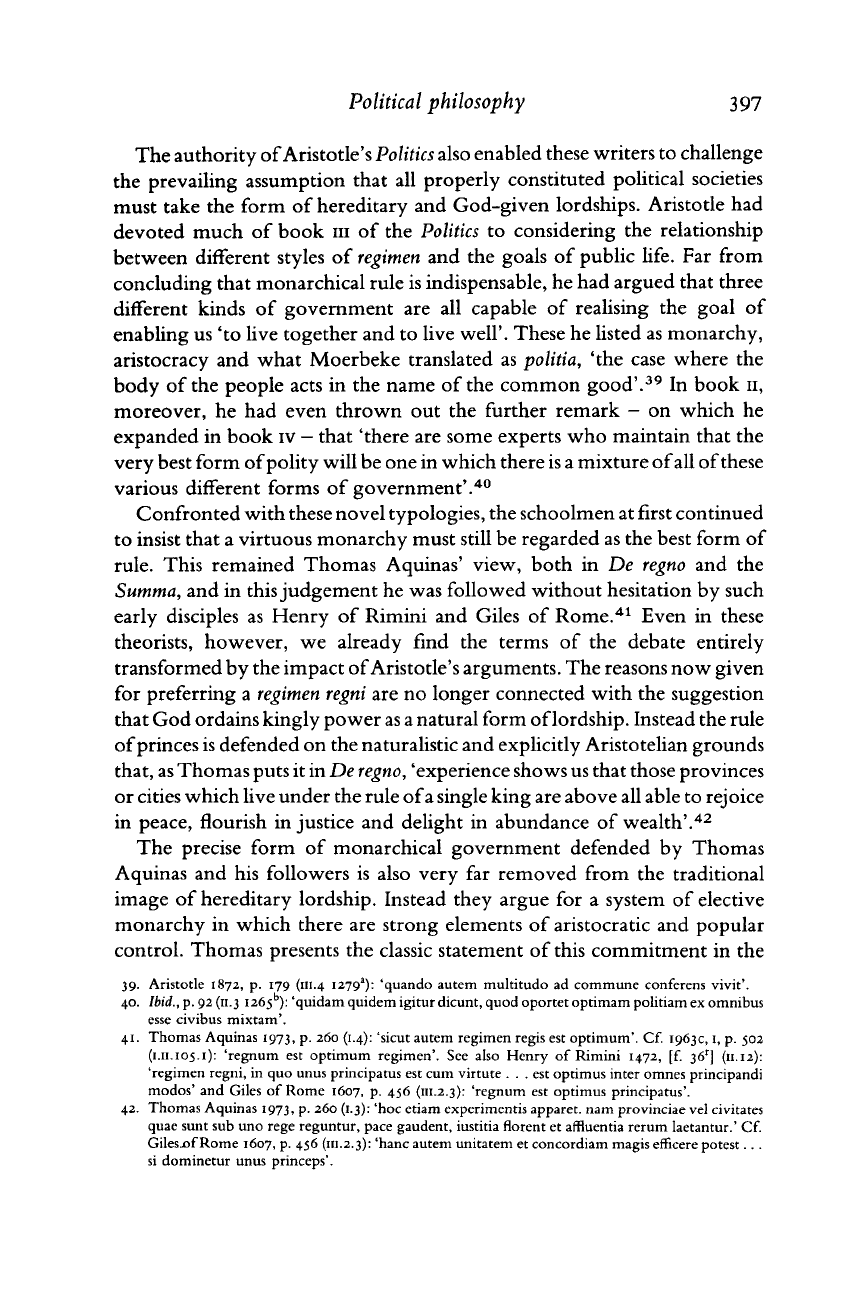
Political
philosophy
397
The
authority of Aristotle's
Politics
also enabled
these
writers to challenge
the prevailing assumption that all properly constituted political
societies
must take the form of hereditary and God-given lordships. Aristotle had
devoted much of book m of the
Politics
to considering the relationship
between different styles of
regimen
and the goals of public life. Far from
concluding that monarchical rule is indispensable, he had argued that three
different kinds of government are all capable of realising the goal of
enabling us 'to live together and to live well'. These he listed as monarchy,
aristocracy and what Moerbeke translated as
politia,
'the case where the
body
of the people acts in the name of the common good'.
39
In book n,
moreover, he had even thrown out the further remark - on which he
expanded in book iv
—
that 'there are
some
experts who maintain that the
very
best form of polity will be one in which there is a mixture of
all
of
these
various different forms of government'.
40
Confronted
with
these
novel typologies, the schoolmen at first continued
to
insist
that a virtuous monarchy must still be regarded as the best form of
rule. This remained Thomas Aquinas' view, both in De
regno
and the
Summa,
and in this judgement he was followed without hesitation by such
early disciples as Henry of Rimini and Giles of Rome.
41
Even in
these
theorists, however, we already find the terms of the debate entirely
transformed by the impact of Aristotle's arguments. The reasons now given
for preferring a
regimen
regni
are no longer connected with the suggestion
that
God ordains kingly power as
a
natural form of lordship. Instead the rule
of princes is defended on the naturalistic and explicitly Aristotelian grounds
that,
as Thomas puts it in De
regno,
'experience shows us that
those
provinces
or cities which live under the rule of a single king are above all able to rejoice
in peace, flourish in justice and delight in abundance of wealth'.
42
The
precise form of monarchical government defended by Thomas
Aquinas
and his followers is also very far removed from the traditional
image of hereditary lordship. Instead they argue for a system of elective
monarchy in which there are strong elements of aristocratic and popular
control. Thomas presents the classic statement of this commitment in the
39. Aristotle 1872, p. 179 (in.4 I279
a
): 'quando autem multitudo ad commune conferens
vivit'.
40.
Ibid.,
p. 92
(11.3
1265
15
):
'quidam quidem igitur dicunt, quod oportet optimam politiam ex omnibus
esse
civibus mixtam'.
41.
Thomas Aquinas 1973, p. 260 (1.4): 'sicut autem regimen regis est optimum'. Cf. 1963c, 1, p. 502
(1.11.105.1):
'regnum est optimum regimen'. See also Henry of Rimini 1472, [f. 36*"]
(11.12):
'regimen regni, in quo unus principatus est cum virtute ... est optimus inter omnes principandi
modos' and Giles of Rome 1607, p. 456
(111.2.3):
'regnum est optimus principatus'.
42. Thomas Aquinas 1973, p. 260
(1.3):
'hoc etiam experimentis apparet. nam provinciae vel civitates
quae sunt sub uno rege reguntur, pace gaudent, iustitia florent et affluentia rerum laetantur.' Cf.
Giles.of
Rome 1607, p. 456
(111.2.3):
'hanc autem unitatem et concordiam magis efficere potest...
si dominetur unus princeps'.
Cambridge Histories Online © Cambridge University Press, 2008
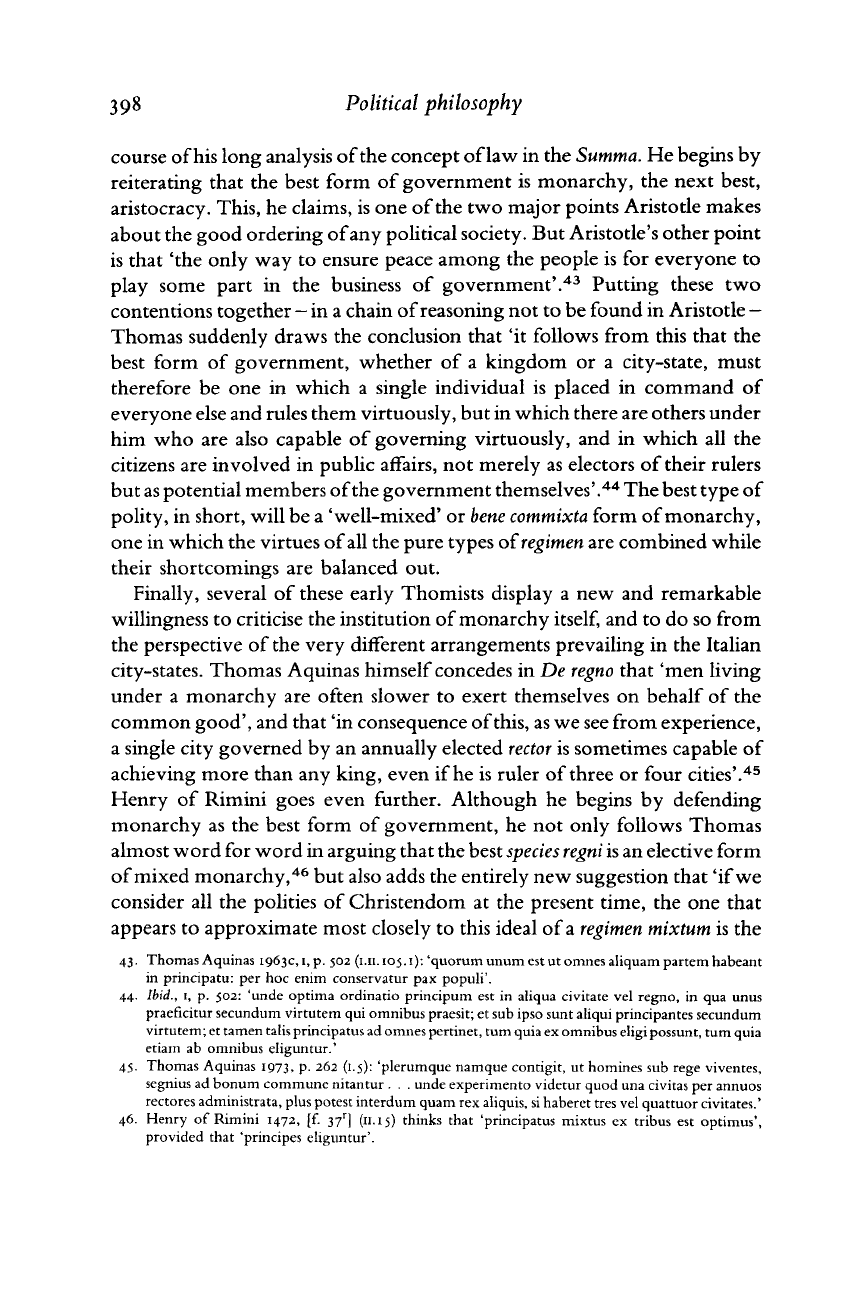
398
Political
philosophy
course of his long analysis of the concept of law in the
Summa.
He begins by
reiterating that the best form of government is monarchy, the next best,
aristocracy.
This,
he claims, is one of the two major points Aristotle makes
about the good ordering of
any
political society. But Aristotle's other point
is that 'the only way to ensure peace among the people is for everyone to
play
some
part in the business of government'.
43
Putting
these
two
contentions together
—
in a chain of reasoning not to be found in Aristotle
—
Thomas
suddenly draws the conclusion that 'it follows from this that the
best form of government, whether of a kingdom or a city-state, must
therefore be one in which a single individual is placed in command of
everyone
else
and rules them virtuously, but in which there are others under
him who are also capable of governing virtuously, and in which all the
citizens are involved in public affairs, not merely as electors of their rulers
but
as potential members of the government themselves'.
44
The best type of
polity, in short, will be a 'well-mixed' or
bene
commixta
form of monarchy,
one in which the virtues of
all
the pure types
of
regimen
are combined while
their shortcomings are balanced out.
Finally,
several of
these
early Thomists display a new and remarkable
willingness to criticise the institution of monarchy
itself,
and to do so from
the perspective of the very different arrangements prevailing in the Italian
city-states. Thomas Aquinas himself concedes in De
regno
that 'men living
under a monarchy are often slower to exert themselves on behalf of the
common good', and that 'in consequence of this, as we see from experience,
a single city governed by an annually elected
rector
is sometimes capable of
achieving more than any king, even if he is ruler of three or four cities'.
45
Henry
of Rimini goes even further. Although he begins by defending
monarchy as the best form of government, he not only follows Thomas
almost word for word in arguing that the best
species
regni
is an elective form
of mixed monarchy,
46
but also adds the entirely new suggestion that 'if we
consider all the polities of Christendom at the present time, the one that
appears to approximate most closely to this ideal of
a
regimen
mixtum is the
43. Thomas Aquinas 1963c, 1, p. 502
(1.11.105.1):
'quorum unum est ut omnes aliquam partem habeant
in principatu: per hoc enim conservatur pax populi'.
44.
Ibid.,
1, p. 502: 'unde optima ordinatio principum est in aliqua civitate vel regno, in qua unus
praeficitur
secundum virtutem qui omnibus praesit; et sub ipso sunt aliqui principantes secundum
virtutem;
et tamen talis principalis ad omnes pertinet, turn quia ex omnibus eligi possunt, turn quia
etiam ab omnibus eliguntur.'
45.
Thomas Aquinas
I973>
P-
262
(1.5):
'plerumque namque contigit, ut homines sub rege viventes,
segnius ad bonum commune nitantur . . . unde experimento videtur quod una civitas per annuos
rectores administrata, plus potest interdum quam rex aliquis, si haberet tres vel quattuor civitates.'
46. Henry of Rimini 1472, [f. 37
r
]
(11.15)
thinks that 'principalis mixtus ex tribus est optimus',
provided
that 'principes eliguntur'.
Cambridge Histories Online © Cambridge University Press, 2008
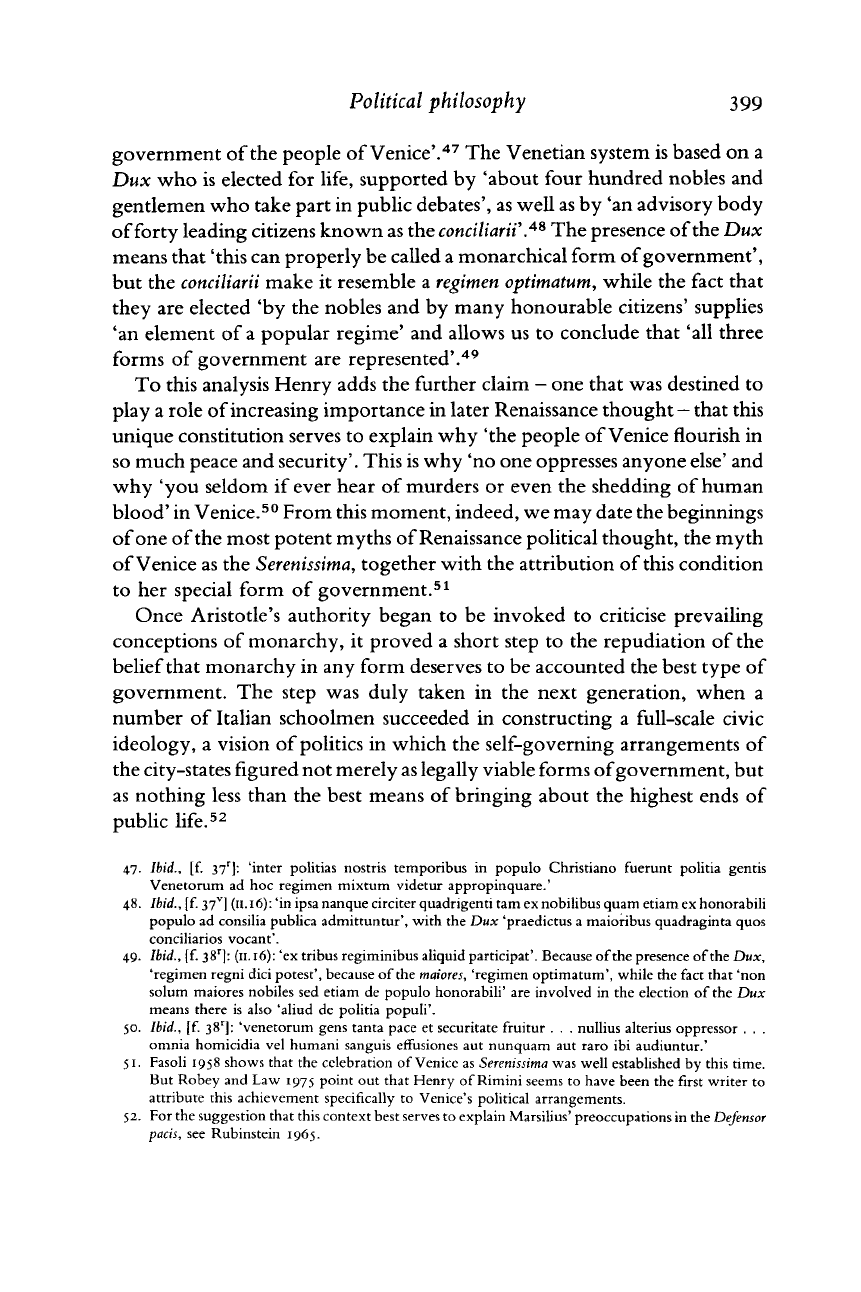
Political
philosophy
399
government of the people of Venice'.
47
The Venetian system is based on a
Dux
who is elected for life, supported by 'about four hundred nobles and
gentlemen who take part in public debates', as well as by 'an advisory body
of
forty
leading citizens known as the
conciliaru
,
48
The presence of the Dux
means that 'this can properly be called a monarchical form of government',
but
the
conciliarii
make it resemble a
regimen
optimatum,
while the fact that
they are elected 'by the nobles and by many honourable citizens' supplies
'an element of
a
popular regime' and allows us to conclude that 'all three
forms of government are represented'.
49
To
this analysis Henry adds the further claim - one that was destined to
play
a role of increasing importance in later Renaissance thought - that this
unique constitution serves to explain why 'the people of Venice flourish in
so much peace and security'. This is why 'no one oppresses anyone
else'
and
why
'you seldom if ever hear of murders or even the shedding of human
blood' in Venice.
50
From this moment, indeed, we may date the beginnings
of one of the most potent myths of Renaissance political thought, the myth
of
Venice
as the
Serenissima,
together with the attribution of this condition
to her special form of government.
51
Once
Aristotle's authority began to be invoked to criticise prevailing
conceptions of monarchy, it proved a short step to the repudiation of the
belief
that
monarchy in any form deserves to be accounted the best type of
government. The step was duly taken in the next generation, when a
number of Italian schoolmen succeeded in constructing a full-scale civic
ideology, a vision of politics in which the self-governing arrangements of
the city-states figured not merely as legally viable forms of government, but
as nothing
less
than the best means of bringing about the highest ends of
public life.
52
47. Ibid.,
[f. 37
r
]: 'inter politias nostris temporibus in populo Christiano fuerunt politia gentis
Venetorum
ad hoc regimen mixtum videtur appropinquare.'
48.
Ibid.,
[f. 37
v
]
(11.16):
'in ipsa nanque circiter quadrigenti tarn ex nobilibus quam etiam ex honorabili
populo ad consilia publica admittuntur', with the Dux 'praedictus a maioribus quadraginta quos
conciliarios vocant'.
49.
Ibid.,
[f. 38
r
]:
(11.16):
'ex tribus regiminibus aliquid participât'. Because of the presence of the Dux,
'regimen regni dici potest', because of the
maiores,
'regimen optimatum', while the fact that 'non
solum maiores nobiles sed etiam de populo honorabili' are involved in the election of the Dux
means there is also 'aliud de politia populi'.
50.
Ibid.,
[f. 38
r
]: 'venetorum gens tanta pace et securitate fruitur . . . nullius alterius oppressor . . .
omnia homicidia vel humani sanguis effusiones aut nunquam aut raro ibi audiuntur.'
51.
Fasoli 1958 shows that the celebration of Venice as
Serenissima
was well established by this time.
But
Robey and Law 1975 point out that Henry of Rimini
seems
to have been the first writer to
attribute
this achievement specifically to Venice's political arrangements.
52.
For the suggestion that this context best serves to explain Marsilius' preoccupations in the
Defensor
pads,
see Rubinstein 1965.
Cambridge Histories Online © Cambridge University Press, 2008
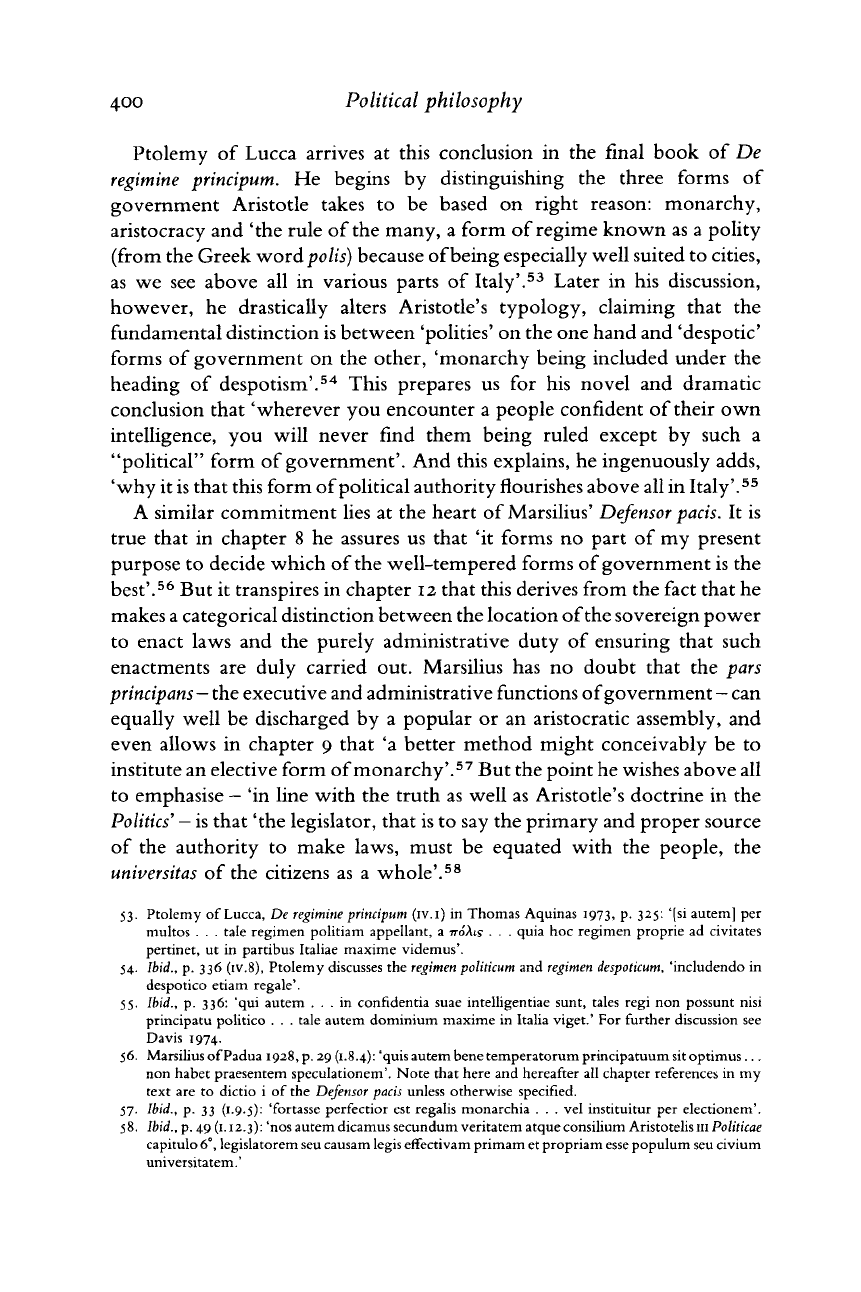
400
Political
philosophy
Ptolemy
of
Lucca arrives
at
this conclusion
in the
final book
of De
regimine principum.
He
begins
by
distinguishing
the
three
forms
of
government Aristotle takes
to be
based
on
right reason: monarchy,
aristocracy
and 'the
rule
of the
many,
a
form
of
regime known
as a
polity
(from
the
Greek word polis) because
of
being especially
well
suited
to
cities,
as
we see
above
all in
various
parts
of
Italy'.
53
Later
in his
discussion,
however,
he
drastically alters Aristotle's typology, claiming
that
the
fundamental distinction
is
between 'polities'
on the one
hand
and
'despotic'
forms
of
government
on the
other, 'monarchy being included under
the
heading
of
despotism'.
54
This prepares
us for his
novel
and
dramatic
conclusion
that
'wherever
you
encounter
a
people confident
of
their
own
intelligence,
you
will
never find them being ruled except
by
such
a
"political"
form
of
government'.
And
this explains,
he
ingenuously adds,
'why
it
is
that
this form
of
political
authority flourishes above all
in
Italy'.
55
A
similar commitment lies
at the
heart
of
Marsilius' Defensor pads.
It is
true
that
in
chapter
8 he
assures
us
that
'it
forms
no
part
of my
present
purpose
to
decide which
of
the well-tempered forms
of
government
is the
best'.
56
But it
transpires
in
chapter 12
that
this derives from
the
fact
that
he
makes
a
categorical distinction between
the
location
of
the sovereign power
to enact laws
and the
purely administrative duty
of
ensuring
that
such
enactments
are
duly carried
out.
Marsilius
has no
doubt
that
the
pars
principans
—
the
executive
and
administrative functions
of
government
—
can
equally
well
be
discharged
by a
popular
or an
aristocratic assembly,
and
even
allows
in
chapter
9
that
'a
better method might conceivably
be to
institute
an
elective form
of
monarchy'.
57
But the
point
he
wishes above
all
to emphasise
- 'in
line with
the truth as
well
as
Aristotle's doctrine
in the
Polities'
—
is
that
'the
legislator,
that
is to say the
primary
and
proper source
of
the
authority
to
make
laws,
must
be
equated with
the
people,
the
universitas
of the
citizens
as a
whole'.
58
53.
Ptolemy of
Lucca,
De
regimine principum
(IV.I)
in Thomas Aquinas 1973, p. 3
2
5
:
'[si autem] per
multos . . . tale regimen politiam appellant, a
noXis
. . . quia hoc regimen proprie ad civitates
pertinet, ut in partibus Italiae maxime videmus'.
54. Ibid.,
p. 336 (iv.8), Ptolemy discusses the
regimen politicum
and
regimen despoticum,
'includendo in
despotico etiam regale'.
55. Ibid.,
p. 336: 'qui autem ... in confidentia suae intelligentiae sunt, tales regi non possunt
nisi
principatu
politico . . . tale autem dominium maxime in Italia viget.' For further discussion see
Davis
1974.
56.
Marsilius of
Padua
1928, p. 29 (1.8.4): 'quis autem bene temperatorum principatuum sit optimus...
non habet praesentem speculationem'. Note that here and hereafter all chapter references in my
text
are to dictio i of the
Defensor pads
unless
otherwise specified.
57. Ibid.,
p. 33 (1.9.5): 'fortasse perfectior est regalis monarchia . . . vel instituitur per electionem'.
58. Ibid.,
p. 49
(1.12.3):
'nos autem dicamus secundum veritatem atque consilium Aristotelisin
Politicae
capitulo
6°, legislatorem seu causam legis erfectivam primam et propriam
esse
populum seu civium
universitatem.'
Cambridge Histories Online © Cambridge University Press, 2008
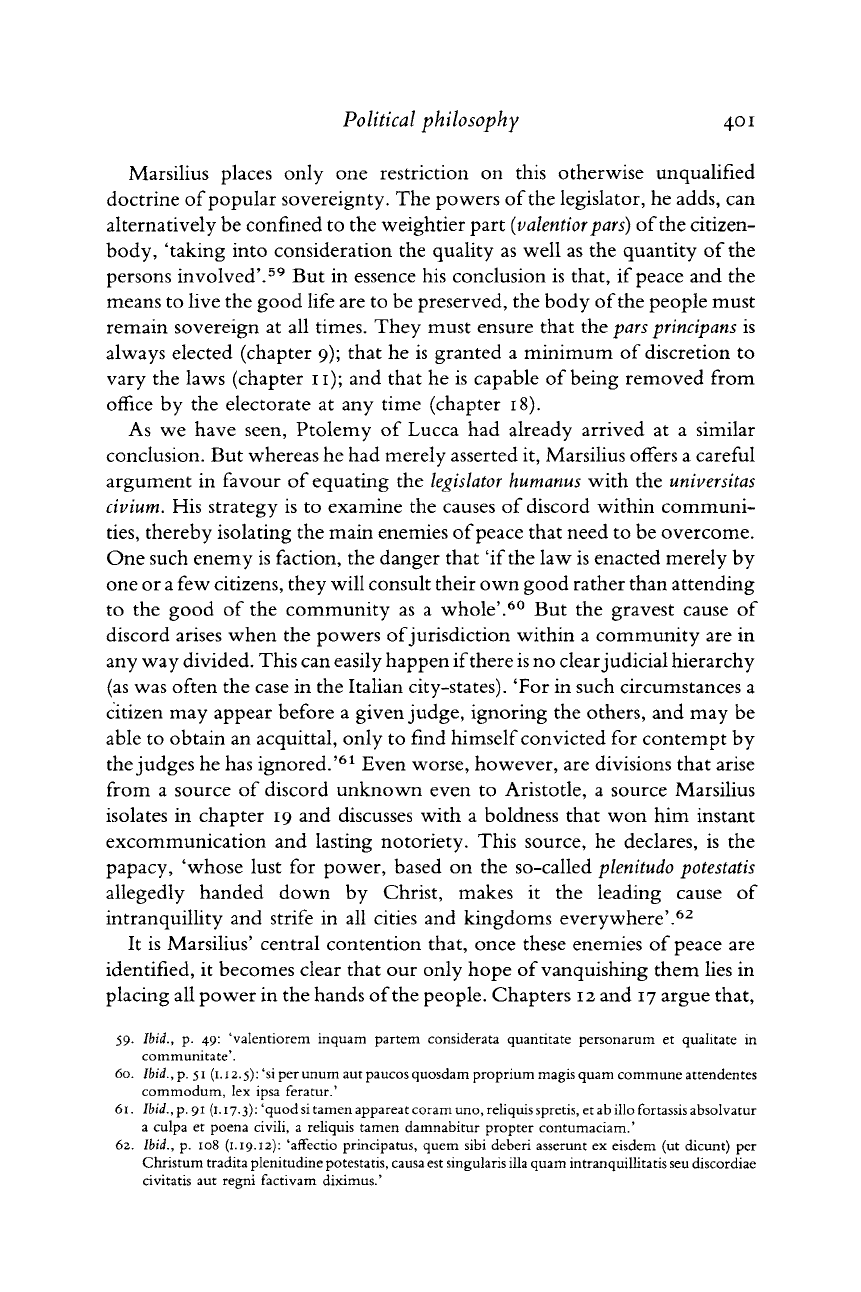
Political
philosophy
401
Marsilius places only one restriction on this otherwise unqualified
doctrine
of
popular
sovereignty. The powers of the legislator, he adds, can
alternatively be confined to the weightier
part
(valentior
pars)
of
the citizen-
body, 'taking into consideration the quality as
well
as the quantity of the
persons involved'.
59
But in essence his conclusion is that, if peace and the
means to
live
the good
life
are to be preserved, the body
of
the people must
remain
sovereign at all times. They must ensure that the
pars
principans
is
always elected (chapter 9); that he is granted a minimum of discretion to
vary
the laws (chapter
11);
and that he is capable of
being
removed from
office by the electorate at any time (chapter 18).
As we have seen, Ptolemy of
Lucca
had already arrived at a similar
conclusion. But whereas he had merely asserted it, Marsilius offers a careful
argument
in favour of equating the
legislator
humanus with the universitas
civium.
His strategy is to examine the causes of discord within communi-
ties, thereby isolating the main enemies
of
peace
that need to be overcome.
One such enemy is faction, the danger that
'if
the law is enacted merely by
one or
a
few citizens, they
will
consult their own good
rather
than attending
to
the good of the community as a whole'.
60
But the gravest cause of
discord arises when the powers
of
jurisdiction within a community are in
any
way divided. This can easily happen
if
there
is no
clear
judicial
hierarchy
(as
was often the case in the Italian city-states).
'For
in such circumstances a
citizen may appear before a given judge, ignoring the others, and may be
able to obtain an acquittal, only to
find
himself convicted for contempt by
the judges he has ignored.'
61
Even worse, however, are
divisions
that arise
from
a source of discord unknown even to Aristotle, a source Marsilius
isolates in chapter 19 and discusses with a boldness that won him instant
excommunication and lasting notoriety. This source, he declares, is the
papacy,
'whose lust for power, based on the so-called plenitudo
potestatis
allegedly handed down by Christ, makes it the leading cause of
intranquillity and strife in all cities and kingdoms everywhere'.
62
It
is Marsilius' central contention that, once these enemies of peace are
identified, it becomes clear that our only hope of vanquishing them
lies
in
placing all power in the hands
of
the people. Chapters
12
and
17
argue that,
59. Ibid., p. 49:
'valentiorem
inquam
partem
considerata
quantitate
personarum
et
qualitate
in
communitate'.
60. Ibid., p. 51 (1.12.5): 'si per
unum
aut
paucos
quosdam
proprium
magis
quam
commune
attendentes
commodum,
lex
ipsa
feratur.'
61.
Ibid., p. 91 (1.17.3):
'quod
si
tamenappareat
coram
uno,
reliquis
spretis,
et ab
illo
fortassis
absolvatur
a
culpa
et
poena
civili,
a
reliquis
tamen
damnabitur
propter
contumaciam.'
62. Ibid., p. 108 (1.19.12):
'affectio
principatus,
quern
sibi
deberi
asserunt
ex
eisdem
(ut
dicunt)
per
Christum
tradita
plenitudine
potestatis,
causa
est
singularis
ilia
quam
intranquillitatis
seu
discordiae
civitatis
aut
regni
factivam
diximus.'
Cambridge Histories Online © Cambridge University Press, 2008
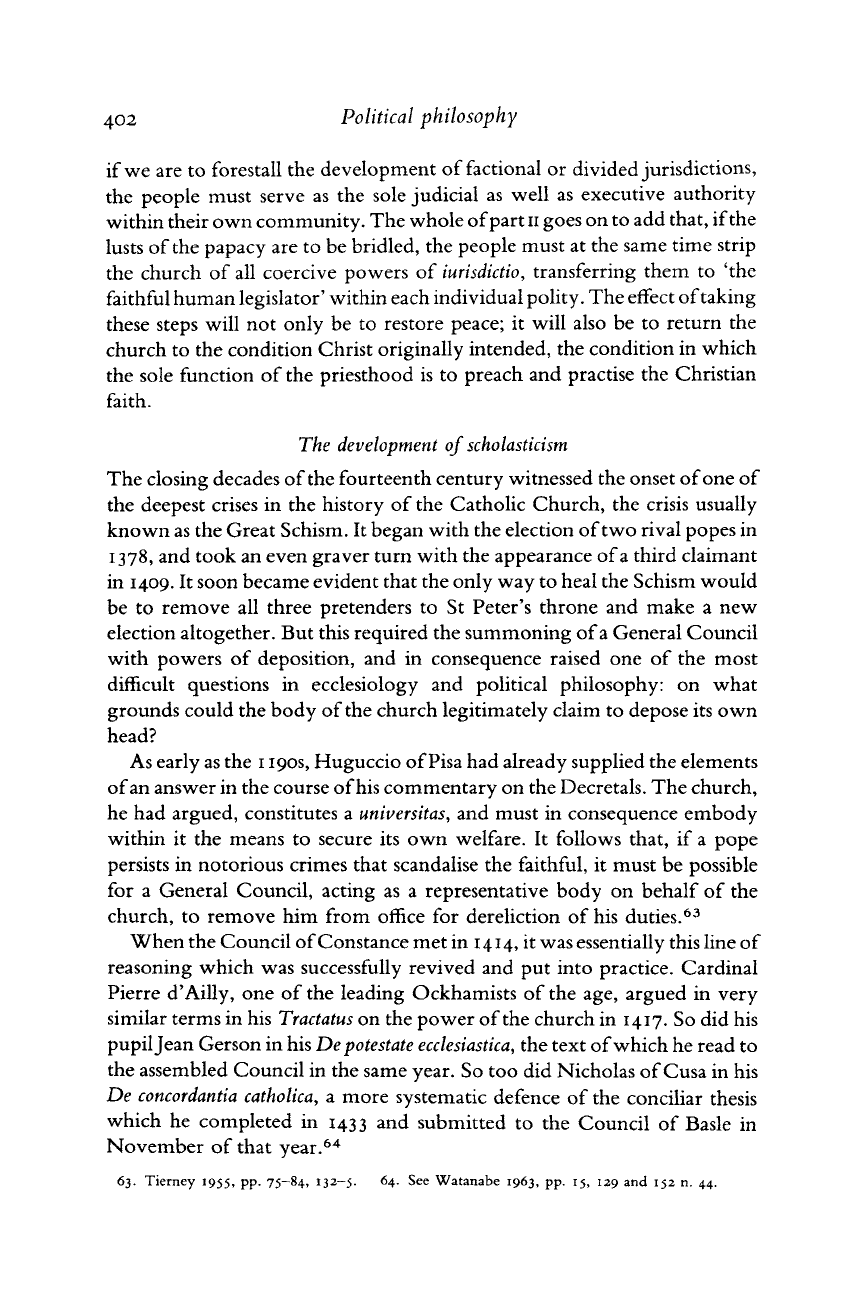
402
Political
philosophy
if
we are to forestall the development of factional or divided jurisdictions,
the people must serve as the
sole
judicial as
well
as executive authority
within their own community. The
whole
of
part
n goes on to add that,
if
the
lusts of the papacy are to be bridled, the people must at the same time strip
the church of all coercive powers of
iurisdictio,
transferring them to 'the
faithful human legislator' within each individual polity. The effect
of
taking
these steps
will
not only be to restore peace; it
will
also be to return the
church
to the condition Christ originally intended, the condition in which
the
sole
function of the priesthood is to preach and practise the Christian
faith.
The
development
of
scholasticism
The
closing decades
of
the fourteenth century witnessed the onset
of
one of
the deepest crises in the history of the Catholic Church, the crisis usually
known as the Great Schism. It began with the election
of
two rival popes in
1378,
and took an even graver turn with the appearance
of
a
third claimant
in
1409.
It soon became evident that the only way to heal the Schism
would
be to remove all three pretenders to St Peter's throne and make a new
election altogether. But this required the summoning
of
a
General Council
with powers of deposition, and in consequence raised one of the most
difficult questions in ecclesiology and political philosophy: on what
grounds could the body
of
the church legitimately claim to depose its own
head?
As early as the
1190s,
Huguccio
of
Pisa
had already supplied the elements
of
an
answer in the course
of
his commentary on the Decretals. The church,
he had argued, constitutes a universitas, and must in consequence embody
within it the means to secure its own welfare. It
follows
that, if a pope
persists in notorious crimes that scandalise the faithful, it must be possible
for
a General Council, acting as a representative body on behalf of the
church,
to remove him from office for dereliction of his duties.
63
When the Council
of
Constance
met in
1414,
it was essentially this
line
of
reasoning which was successfully revived and put into practice. Cardinal
Pierre
d'Ailly,
one of the leading Ockhamists of the age, argued in very
similar terms in his
Tractatus
on the power
of
the church in
1417.
So did his
pupil
Jean
Gerson in his
Depotestate
ecclesiastica,
the text
of
which he read to
the assembled Council in the same year. So too did Nicholas of
Cusa
in his
De
concordantia
catholica,
a more systematic defence of the conciliar thesis
which he completed in 1433 and submitted to the Council of Basle in
November of that year.
64
63.
Tierney
1955, pp.
75-84,
132-5-
6
4- See
Watanabe
1963, pp. 15, 129 and 152 n. 44.
Cambridge Histories Online © Cambridge University Press, 2008
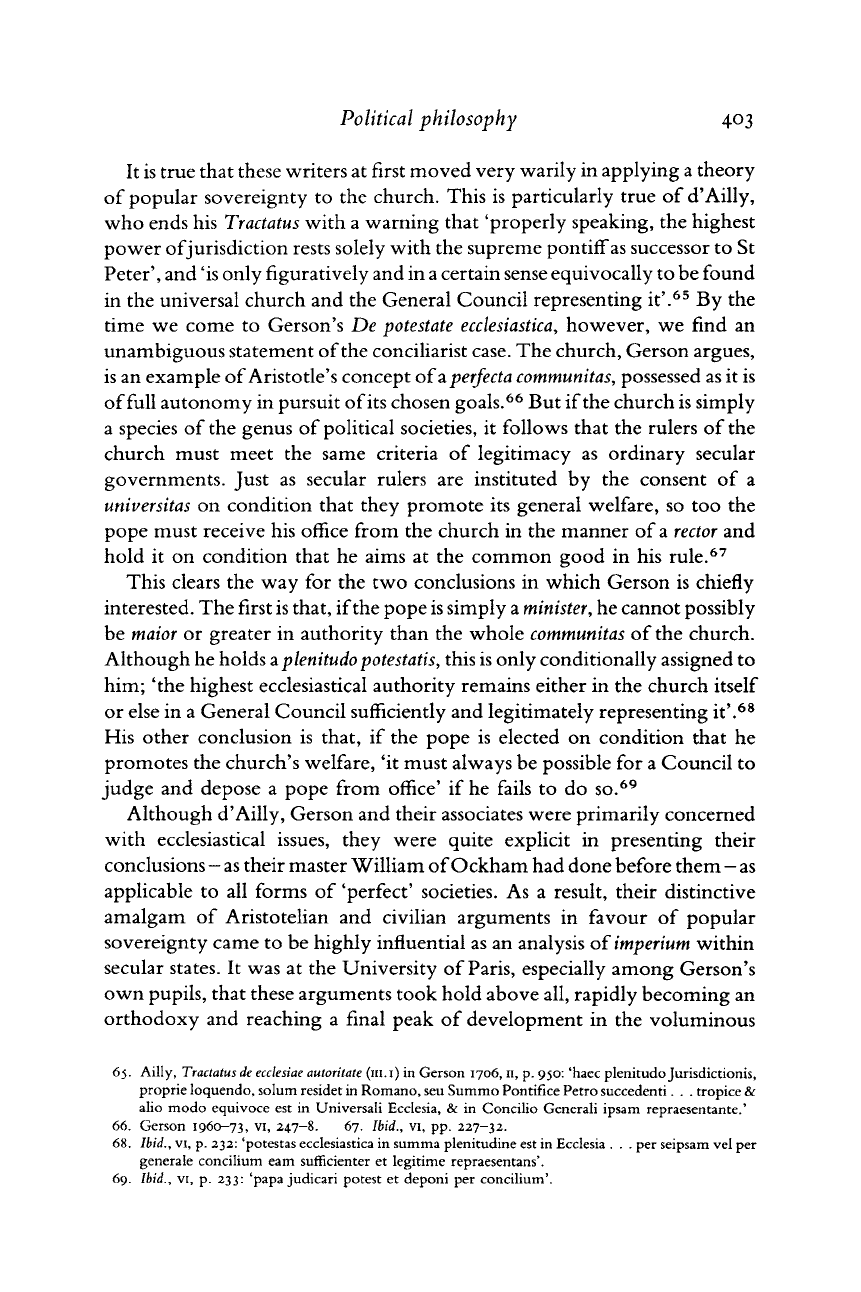
Political
philosophy
403
It
is true that these writers at first moved very warily in applying a theory
of
popular sovereignty to the church. This is particularly true of
d'Ailly,
who ends his
Tractatus
with a warning that 'properly speaking, the highest
power
of
jurisdiction rests
solely
with the supreme pontiff
as
successor to St
Peter',
and 'is only figuratively and in
a
certain
sense equivocally to be found
in the universal church and the General Council representing it'.
65
By the
time we come to Gerson's De
potestate
ecclesiastica,
however, we
find
an
unambiguous statement
of
the conciliarist case. The
church,
Gerson argues,
is an example
of
Aristotle's concept
ofzperfecta
communitas, possessed as it is
of
full
autonomy in pursuit
of
its chosen goals.
66
But
if
the church is simply
a
species of the genus of political societies, it
follows
that the rulers of the
church
must meet the same
criteria
of legitimacy as ordinary secular
governments.
Just
as secular rulers are instituted by the consent of a
universitas
on condition that they promote its general welfare, so too the
pope must receive his office from the church in the manner of
a
rector
and
hold it on condition that he aims at the common good in his rule.
67
This clears the way for the two conclusions in which Gerson is chiefly
interested. The first is
that,
if
the pope is simply
a
minister, he cannot possibly
be
maior
or greater in authority than the whole communitas of the church.
Although he holds
aplenitudopotestatis,
this is only conditionally assigned to
him; 'the highest ecclesiastical authority remains either in the church itself
or
else
in a General Council sufficiently and legitimately representing it'.
68
His other conclusion is that, if the pope is elected on condition that he
promotes the church's welfare, 'it must always be possible for a Council to
judge and depose a pope from office' if he fails to do so.
69
Although
d'Ailly,
Gerson and their associates were primarily concerned
with ecclesiastical issues, they were quite explicit in presenting their
conclusions
—
as
their
master
William
of
Ockham
had done before them
—
as
applicable to all forms of 'perfect' societies. As a result, their distinctive
amalgam
of Aristotelian and civilian arguments in favour of popular
sovereignty came to be highly influential as an analysis of imperium within
secular
states. It was at the University of
Paris,
especially among Gerson's
own pupils, that these arguments took hold above all, rapidly becoming an
orthodoxy
and reaching a final peak of development in the voluminous
65. Ailly, Tractatus de
ecclesiae
autoritate
(III.I)
in
Gerson
1706,11, p. 950:
'haec
plenitudo
Jurisdictionis,
proprie
loquendo,
solum
residet
in
Romano,
seu
Summo
Pontifice
Petro
succedenti.
. .
tropice
&
alio
modo
equivoce
est in
Universali
Ecclesia,
& in
Concilio
Generali
ipsam
repraesentante.'
66.
Gerson
1960-73,
vi,
247-8.
67. Ibid., vi, pp.
227-32.
68. Ibid., vi, p. 232:
'potestas
ecclesiastica
in
summa
plenitudine
est in
Ecclesia
. . . per
seipsam
vel per
generale
concilium
earn
sufficienter
et
legitime
repraesentans'.
69. Ibid., vi, p. 233: 'papa judicari
potest
et
deponi
per
concilium'.
Cambridge Histories Online © Cambridge University Press, 2008
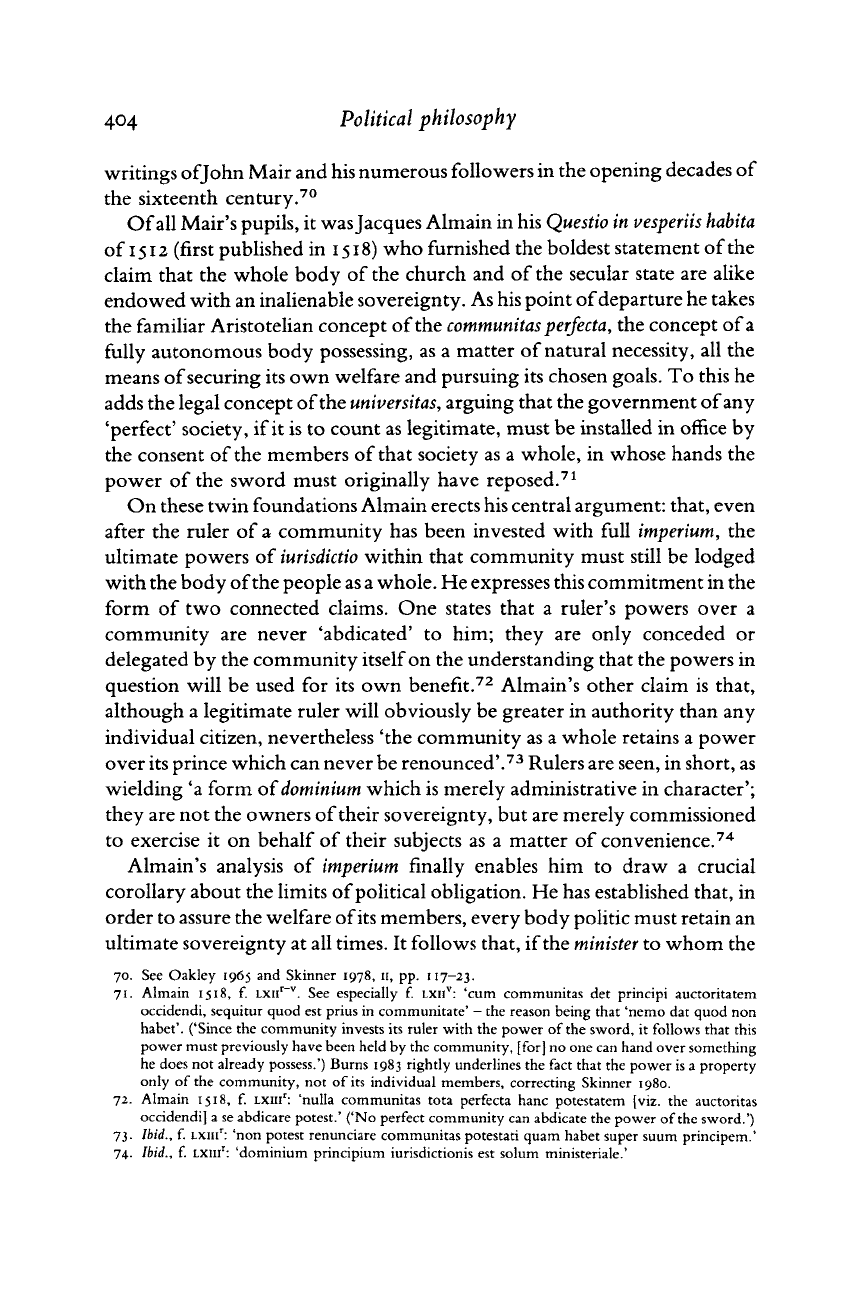
404
Political
philosophy
writings
of
John
Mair
and his numerous followers
in
the opening decades
of
the
sixteenth century.
70
Of
all
Mair's
pupils,
it
was
Jacques
Almain
in
his
Questio
in
vesperiis
habita
of
1512
(first published
in
1518)
who
furnished the boldest statement
of
the
claim
that
the
whole body
of
the church
and of
the secular state are alike
endowed with an inalienable sovereignty. As his point
of
departure
he takes
the
familiar Aristotelian concept
of
the
communitas
perfecta,
the concept
of
a
fully
autonomous body possessing,
as a
matter
of
natural
necessity,
all the
means
of
securing
its own
welfare and pursuing
its
chosen goals.
To
this
he
adds the legal concept
of
the
universitas,
arguing that the government
of
any
'perfect'
society,
if
it
is to
count as legitimate, must
be
installed
in
office
by
the
consent
of
the members
of
that
society
as a
whole,
in
whose hands
the
power
of
the sword must originally have reposed.
71
On these twin foundations Almain
erects
his
central
argument:
that, even
after
the
ruler
of
a community
has
been invested with
full
imperium,
the
ultimate
powers
of
iurisdictio
within that community must
still
be
lodged
with the body
of
the
people
as
a
whole. He expresses this commitment in the
form
of two
connected claims.
One
states that
a
ruler's powers over
a
community
are
never 'abdicated'
to him;
they
are
only conceded
or
delegated
by
the community itself on the understanding that the powers
in
question
will be
used
for its own
benefit.
72
Almain's other claim
is
that,
although
a
legitimate
ruler
will
obviously
be
greater
in
authority than
any
individual citizen, nevertheless 'the community as
a
whole retains
a
power
over
its prince which can never be renounced'.
73
Rulers
are
seen,
in
short,
as
wielding
'a form
of
dominium which
is
merely administrative
in
character';
they
are
not
the owners
of
their
sovereignty, but
are
merely commissioned
to
exercise
it on
behalf
of
their subjects
as a
matter
of
convenience.
74
Almain's analysis
of
imperium finally enables
him to
draw
a
crucial
corollary
about the limits
of
political obligation.
He
has established that,
in
order
to
assure
the welfare
of
its members, every body politic must
retain
an
ultimate
sovereignty at
all
times. It
follows
that,
if
the
minister
to
whom
the
70.
See
Oakley
1965 and Skinner 1978,
11,
pp.
117-23.
71.
Almain 1518, f.
Lxii
r_v
.
See especially f.
LXII
v
:
'cum communitas det principi auctoritatem
occidendi, sequitur quod est prius in communitate' - the reason being that 'nemo dat quod non
habet'.
('Since
the community invests its ruler with the power of the sword, it follows that
this
power must previously have been held by the community, [for] no one can hand over something
he
does
not already
possess.')
Burns 1983 rightly underlines the fact that the power is a property
only of the community, not of its individual members, correcting Skinner 1980.
72.
Almain 1518, f.
Lxm
r
:
'nulla communitas tota perfecta hanc potestatem [viz. the auctoritas
occidendi] a se abdicare potest.' ('No perfect community can abdicate the power of the sword.')
73. Ibid.,
f.
Lxm
r
:
'non potest renunciare communitas potestati quam habet super suum principem.'
74. Ibid.,
f.
LXin
r
:
'dominium principium iurisdictionis est solum ministeriale.'
Cambridge Histories Online © Cambridge University Press, 2008
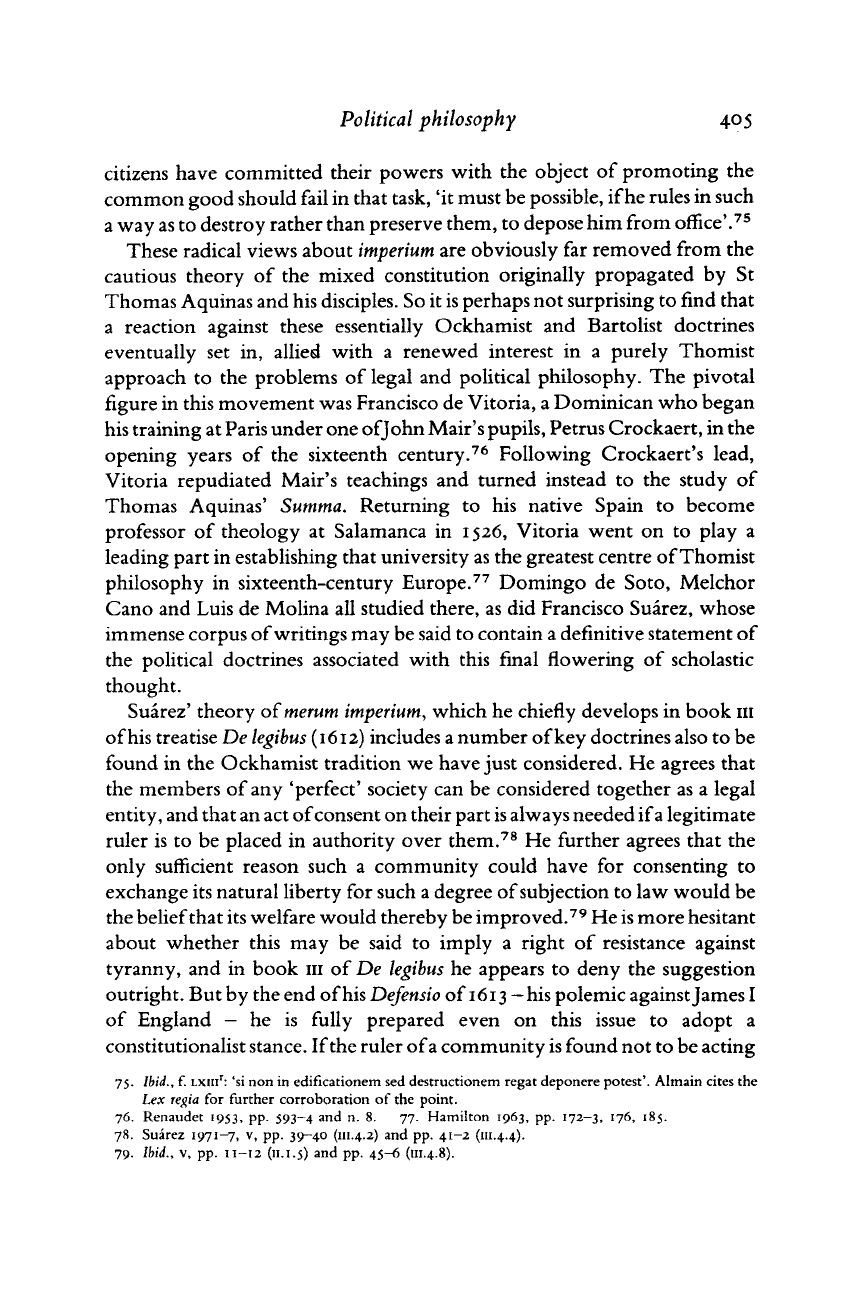
Political
philosophy
405
citizens have committed their powers
with
the object of promoting the
common good
should
fail in that task, 'it must be
possible,
if
he rules in such
a
way as to destroy
rather
than preserve them, to depose him from office\
75
These radical
views
about imperium are
obviously
far removed from the
cautious theory of the mixed constitution originally propagated by St
Thomas Aquinas and his disciples. So it is perhaps not surprising to
find
that
a
reaction against these essentially Ockhamist and Bartolist doctrines
eventually set in,
allied
with
a renewed interest in a purely Thomist
approach
to the problems of legal and political philosophy. The pivotal
figure in this movement was
Francisco
de Vitoria, a Dominican who began
his training at
Paris
under one
of
John
Mair's pupils, Petrus
Crockaert,
in the
opening
years of the sixteenth century.
76
Following Crockaert's lead,
Vitoria
repudiated Mair's teachings and turned instead to the study of
Thomas Aquinas' Summa. Returning to his native Spain to become
professor of theology at Salamanca in 1526, Vitoria went on to play a
leading
part
in establishing that university as the greatest centre
of
Thomist
philosophy
in sixteenth-century Europe.
77
Domingo de Soto, Melchor
Cano
and Luis de Molina all studied there, as did Francisco Suarez,
whose
immense corpus
of
writings may be said to contain a
definitive
statement of
the political doctrines associated
with
this final flowering of scholastic
thought.
Suarez'
theory ofmerum imperium, which he chiefly
develops
in book m
of
his treatise De
legibus
(1612)
includes
a
number
of
key doctrines also to be
found in the Ockhamist tradition we have just considered. He agrees that
the members of any 'perfect' society can be considered together as a legal
entity, and that an act
of
consent on their
part
is always needed
if a
legitimate
ruler
is to be placed in authority over them.
78
He further agrees that the
only
sufficient reason such a community could have for consenting to
exchange its natural liberty for such a degree
of
subjection to law
would
be
the belief
that
its welfare
would
thereby be improved.
79
He is more hesitant
about whether this may be said to imply a right of resistance against
tyranny,
and in book
111
of De
legibus
he appears to deny the suggestion
outright. But by the end
of
his
Defensio
of
1613
- his polemic against
James
I
of
England — he is
fully
prepared
even
on this
issue
to adopt a
constitutionalist stance.
If
the ruler
of a
community is found not to be acting
75.
Ibid., f.
Lxm
r
:
'si non in
edificationem
sed
destructionem
regat
deponere
potest'.
Almain
cites
the
Lex
regia for
further
corroboration
of the
point.
76.
Renaudet
1953, pp.
593-4
and n. 8. 77.
Hamilton
1963, pp. 172-3, 176, 185.
78.
Suarez
1971-7, v, pp.
39-40
(m.4.2)
and pp. 41-2
(m.4.4).
79. Ibid., v, pp. 11-12 (11.1.5) and pp. 45-6 (111.4.8).
Cambridge Histories Online © Cambridge University Press, 2008
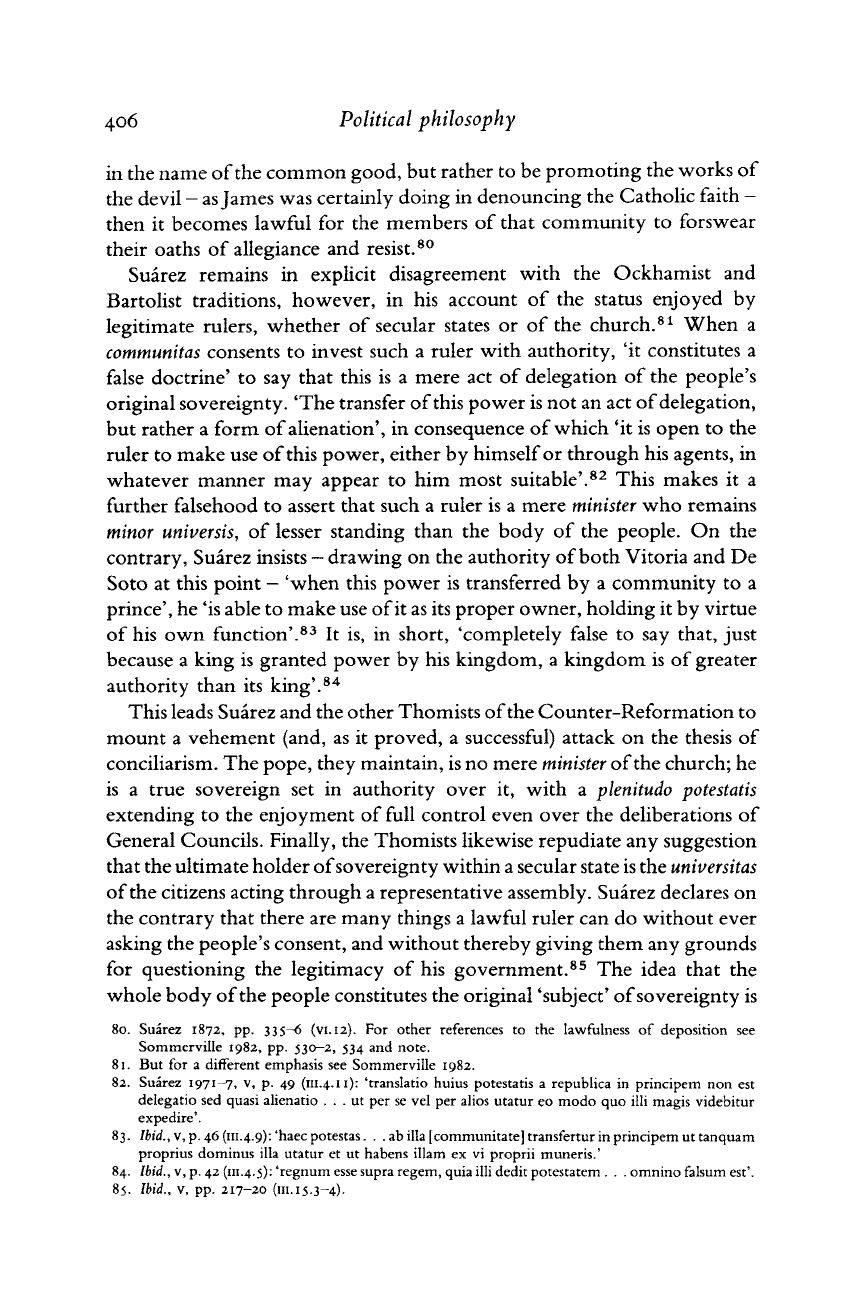
406
Political
philosophy
in the name
of
the common good, but
rather
to be promoting the works of
the devil -
as
James
was certainly doing in denouncing the Catholic faith -
then it becomes lawful for the members of that community to forswear
their
oaths of allegiance and resist.
80
Suarez
remains in explicit disagreement with the Ockhamist and
Bartolist
traditions, however, in his account of the status enjoyed by
legitimate rulers, whether of secular states or of the church.
81
When a
communitas
consents to invest such a ruler with authority, 'it constitutes a
false doctrine' to say that this is a mere act of delegation of the people's
original sovereignty. 'The transfer
of
this power is not an act
of
delegation,
but
rather
a form of alienation', in consequence of which 'it is open to the
ruler
to make use
of
this power, either by himself
or
through his agents, in
whatever manner may appear to him most suitable'.
82
This makes it a
further
falsehood to assert that such a ruler is a mere minister who remains
minor
universis, of lesser standing than the body of the people. On the
contrary,
Suarez insists - drawing on the authority
of
both Vitoria and De
Soto at this point
—
'when this power is transferred by a community to a
prince',
he 'is able to make use
of
it as its proper owner, holding it by virtue
of
his own function'.
83
It is, in short, 'completely false to say that, just
because a
king
is granted power by his kingdom, a kingdom is of
greater
authority
than its king'.
84
This leads Suarez and the other Thomists
of
the Counter-Reformation to
mount a vehement (and, as it proved, a successful)
attack
on the thesis of
conciliarism. The pope, they maintain, is no mere minister
of
the
church;
he
is a true sovereign set in authority over it, with a plenitudo
potestatis
extending to the enjoyment of
full
control even over the deliberations of
General
Councils. Finally, the Thomists
likewise
repudiate any suggestion
that
the ultimate holder
of
sovereignty within a secular state is the universitas
of
the citizens acting through a representative assembly. Suarez declares on
the
contrary
that there are many things a lawful ruler can do without ever
asking the people's consent, and without thereby
giving
them any grounds
for
questioning the legitimacy of his government.
85
The idea that the
whole body
of
the people constitutes the original 'subject'
of
sovereignty is
80.
Suarez
1872, pp.
335-6
(vi.12). For
other
references
to the
lawfulness
of
deposition
see
Sommerville
1982, pp.
530-2,
534 and
note.
81. But for a
different
emphasis
see
Sommerville
1982.
82.
Suarez
1971-7, v, p. 49 (m.4.11):
'translatio
huius
potestatis
a
republica
in
principem
non est
delegatio
sed
quasi
alienatio
. . . ut per se vel per
alios
utatur
eo
modo
quo
illi
magis
videbitur
expedire'.
83. Ibid., v, p. 46
(m.4.9):
'haec
potestas.
. . ab
ilia
[communitate]
transfertur
in
principem
ut
tanquam
proprius
dominus
ilia
utatur
et ut
habens
illam
ex vi
proprii
muneris.'
84. Ibid.,v, p. 42(111.4.5):
'regnum
esse
supra
regem,
quia
illi
dedit
potestatem
. . .
omnino
falsum
est'.
85. Ibid., v, pp. 217-20 (in. 15.3-4).
Cambridge Histories Online © Cambridge University Press, 2008
